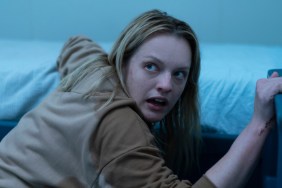Haruki Murakami’s 1987 novel Norwegian Wood became a phenomenon not only in his native country of Japan, but also became required reading for young people here in the States, though it was deemed controversial in both countries due to its frank portrayal of sexuality. The story follows Tokyo college student Toru Watanabe going through a coming-of-age in the ’60s, having to choose between two very different women, and considering how quickly books are adapted these days, it may be a surprise that it took 23 years for someone to tackle it. That’s because the publicity-shy Murakami refused to let anyone get the rights to make his books into films until French-Vietnamese filmmaker Tran Anh Hung came along.
The acclaimed filmmaker behind the Oscar-nominated The Scent of Green Papaya and Cyclo cast Kenichi Matusyama (Death Note) as Watanabe, the young man who falls for his dead best friend’s girlfriend Naoko, played by Rinko Kikuchi, who received an Oscar nomination for her role in Babel. Sleeping together sends her over the edge and she’s relegated to a sanitarium in the country while Watanabe goes to college in Tokyo and meets the free-spirited Midiro, played by newcomer Kiko Mizuhara.
The results are a rather slow moving film but one that’s beautifully shot as Hung captures Japan in a way only an outsider could have done, but he pulled an even bigger coup by convincing Radiohead’s Johnny Greenwood to provide the score for the film, only the second time he’d done so since scoring Paul Thomas Anderson’s There Will Be Blood.
ComingSoon.net sat down with Tran and Rinko a few weeks back to talk about the movie. Though we had spoken to Ms. Kikuchi for her Oscar-nominated role in Babel five years ago, we were surprised to learn this would be one of her first interviews done in English without a translator. We felt bad, because we could tell she was getting a little frustrated with not being able to express herself, but her manager insisted she stick to English and she did just fine.
ComingSoon.net: This is a very popular book and I’m surprised it hasn’t been made into a movie, so how did you go about getting the rights to make the movie, and was it hard to get financing since it’s somewhat controversial?
Tran Anh Hung No, the only thing was that Murakami was very careful with his work, so it’s normal. He tried to protect his work, so I knew that before this project, he never allowed anyone to adapt his books. When we heard that allowed someone to adapt one of his short stories, then we thought that maybe it’s time to ask. I sent him a letter, and he accepted to meet with me, so I flew there to Tokyo, and the meeting was very simple. He asked for two conditions: One is to read the script and the other thing is to know the budget of the movie, because he was aware of the fact you could make a movie for 2 (million) or 10 (million) and it would be two different movies. We spent a year or two to give him all this, because I needed time to write the script and the producer needed time to meet with financiers and to know how much he can raise for the project. And that was it.
Rinko Kikuchi: I hear that he was big fan of your films. He already knew about your films and that’s why he accepted.
Hung: Yes, I think he might have seen something in my movies which could fit his book. I think that’s why he accepted to meet with me.
CS: Rinko, what was your connection to the book? Had you already read it in school and were familiar with the character?
Kikuchi: When I read this book, I was the same age as her. I was so in love with her, but I didn’t understand her despair because I was too young when I read the book, but she was still in my head and my heart, and then almost ten years later I got the part.
CS: Did you know he was making the movie and did you chase after the role or did he come to you?
Kikuchi: I just saw about it on the news because that was really big news that Tran was doing Haroki’s book as a movie. I found out from my agent, and I called the producer and said I wanted to audition for the role, but he thought I was not right for the part, which wasn’t fair, but I called them over and over again and said, “Please, I really want to do that,” and finally, I did a video audition in front of a camera, I just did some scenes and a day after, I finally met him.
Hung: Thank you. You were right.

CS: I’m glad it worked out. I’ve only been to Japan once myself, but I’m sure there must have been some controversy about a non-Japanese director making this movie. How did you get past that? Was having the support of the author enough?
Hung: I didn’t read all the blogs because it’s Japanese, which I don’t know. The people in the crew told me that some people think nobody should touch this book, that it’s not adaptable. Some people said that some Japanese directors should do this project.
Kikuchi: I don’t think so.
Hung: But it’s not a problem for me. For me, it’s quite obvious that I would like to adapt it. It was obvious for me because I saw the movie when I read the book, so it was not a problem.
CS: Do you speak Japanese yourself?
Hung: No.
CS: So you had to translate it into Japanese and the had to work with the translation?
Hung: Yes.
Kikuchi: But I think he has the sense of Japanese voice, like music or rhythm, because if I read a line and I felt that it was no good but thought maybe he didn’t know about it, but he would say, “Rinko, it’s no good.” I think he had a sense of voice or rhythm, like a song.
CS: I have to imagine it’s hard to tell. I don’t speak Japanese, so I never know if the subtitles are saying something completely different.
Hung: It’s quite obvious when you watch a movie when you don’t know the language. You can see if the actors are good or not. It’s obvious and for me, it’s the same thing. I can see it. Since I cannot speak Japanese, I only focus on the music of the line, so we worked a lot before that on the dialogue with the producer and his team. We worked months on the lines and we fight a lot, and several interpreters, they had to resign because the exchange was so violent sometimes, and I would ask for something that was not normal for Japanese people, like at the end of the movie we have one line, which is “I love you” on the phone, and normally, in Japan, people don’t say that kind of words, but I insisted. I thought it could be possible to make it natural, and I didn’t have any complaints about it.
CS: I imagine the novel is somewhat controversial in Japan because it has women talking fairly casually about sex, so what about the book or character did you connect with when you first read it and were there any worries about doing a controversial character like this?
Kikuchi: Yeah, I had a lot of pressure, because Haruki has a lot of fans for his novel and also, when I read this book, she’s very transparent, but my work, I have to build up her character and that was really hard work for me. Because readers have a lot of images of her.
CS: Of course, anyone who reads a book will think they know the character best.
Hung: What you said about this kind of controversy, it’s something that really made this book very popular. Why? Because the fact that women in Japan don’t talk about sex, but the inner reality is that they talk about sex inside of their head, so when you find a space where all this is express in a very right way, then people like it. The great difference between experience in life you cannot experience this, but you can express your inner feelings with the book. That’s why the book is so close to the reader, that kind of intimacy between the reader and the book that was really great. That is why the book is so popular.
CS: Obviously, a big coup was getting Johnny Greenwood of Radiohead to do the music, because he’d done only one other soundtrack (“There Will Be Blood”) which really put him on the map as a composer. How did you approach him? Had he read the book?
Hung: Yes, when I approached him, he had read the book before. I don’t know when but he knew the book, and when I asked him if he would like to do the score for the movie, he said “Yes.” But there’s a long story after that. Would you like to know the long story?
Kikuchi: (laughs) It is a long story.
Hung: The long story is he accepted but three months later, he refused because Thom Yorke wanted to go back to the studio to record their next album, so when Greenwood told me he wouldn’t have time anymore “because when you start with Thom you don’t know when you’re finished.” He said to me he was sorry that he couldn’t do it, but then we shot the movie and we started to cut it, and when I had a good cut, then I started to think about his music and I tried his music from “There Will Be Blood” on some scenes and it works so well. It looks natural, so I sent him an Email saying that it’s amazing and he said, “It’s not possible because the Irish music of ‘There Will Be Blood’ has nothing to do with your Japanese story, but I’ll send you samples, so I sent him some scenes with his music and he was convinced. He told me that if I accept not to use a big orchestra, but only a sextet, then he would have time to do the music. I said “Okay” for the sextet, but then later on, after working together, he came back and said, “Okay, we need orchestra
”

CS: What was shooting this movie like for because your character Naoko goes through a lot of things emotionally and when you see the movie, you’re kind of in and out because we’re following Kenichi’s character then we come back to you. What was that like? Did you just have a lot of days of crying?
Kikuchi: Yeah, it was really hard but actually, I enjoy the very painful process of playing this role, but she was really in deep despair, and I couldn’t carry her night and day. It’s too deep and too dark, so when I finished the shoot, I just listened to punk rock music, driving so hard, and drinking alcohol, because it was really overwhelming when I got back home, so I have to release her character every day.
Hung: It was really moving to see her during the shooting for a scene where she has to cry, I wanted to help her, but no, no, I had to keep my distance from her.
Kikuchi: But he knew it
Hung: Had to leave her like this but I get really moved sometimes, and I had tears in my eyes, but keep distance.
CS: You have to capture the moment.
Hung: Yes, if I helped her, somehow, it would be a relief but her, but no, you should not. She had to carry all this until the end of the shooting.
Kikuchi: Yeah, because I could keep making an effort to play what he needed. Where did I want to go? I focused on my goal, so I think he knew it.
Hung: Yes, we never met outside of shooting. Only when we finished the movie, but during the movie I never saw her, only on the set.
Kikuchi: Because I just wanted to see his smile. “Oh, you did great.” But such tiny stuff. He never went “Oh, Rinko, that’s amazing!” No, never. That’s why I kept doing it.
Hung: That’s why she didn’t fall in love with me.
Kikuchi: Yeah.
Hung: She’s always falling in love with directors who smile at her.
Kikuchi: (laughs)
CS: You do work with a lot of Western directors who I’m sure are more forthcoming with their enthusiasm.
Kikuchi: Yeah. Well, basically, I fall in love with the director on set; I really want to know what they think about me and all that kind of thing.
CS: Okay, I’ll have to ask Guillermo del Toro about that. I was on the set of “47 Ronin” and I was disappointed you weren’t there, though we did talk about you. Have you seen any of the movie yet?
Kikuchi: No, no, I haven’t seen it. Yeah, I’m not sure. My role is like a bad witch, wearing white contact lenses and long hair and a push-up bra. I’m so sexy, very different.
CS: Have you finished shooting “Pacific Rim” already?
Kikuchi: No, no, we’re still shooting in Toronto until April.
CS: Of course, the Japanese created the modern monster movie so is that very obviously paying homage to those monster movies or is it very different?
Kikuchi: Quite similar, but also super-original, because Guillermo can do it.
CS: Tran, before you did “I Come with the Rain,” you directed a couple Vietnamese movies but then didn’t make any movies for roughly 7 or 8 years. So have you been developing other things since finishing this?
Hung: Yes, I work on different projects but we couldn’t make them. Sometimes, I work for two years on a project and it collapses. That’s why there’s this big gap between my third and fourth movie, and “I Come with the Rain” was a very bad experience because of the producer. We fought a lot, for a year in court during the editing process. That’s why the movie was not really the one I would like to show.
CS: I’ve never seen the movie but I actually interviewed Josh Hartnett a day or two before he was going to Hong Kong to film it, so I heard about it and knew about it but never had a chance to see it. I guess you don’t want people to see it?
Hung: No, not really. Yeah, the movie has really really strong scenes, beautiful scenes, but the whole thing doesn’t have the music, the feeling that I wanted, because it was very disturbing cutting the movie in that kind of atmosphere. I cut the movie for three weeks, we stopped, we went to court for three months, we fought, then we come back for four more weeks and edit. Then you work until the last minute of these four weeks. At midnight, you stop everything and go back to court and fight again, and then you have six more weeks. It’s crazy!
CS: I assume no one under 18 will have a chance to see “Norwegian Wood” at least in theaters but what would you like young people who see this movie to get out of the journey and the character?
Hung: I just think the movie should connect them to this idea of first love, and sometimes, first love can be very dangerous, and that was the case in this story. Also, if people can get out of the theater with the feeling of something beautiful, related to what is dark inside of us, but at the same time, really beautiful, then it is something that is important.
Kikuchi: I think everything has an end, but when they were young, before 12, they were so innocent and she and Kizuki wanted to just keep a beautiful memory as they were, so it’s so poetic, but I can’t think about it in my life, because it’s too sad.
Norwegian Wood opens in New York at the IFC Center on Friday, January 6.









